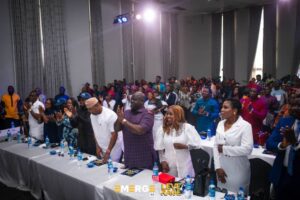
$3trn needed to bridge infrastructure gap in 30 years — Soludo
Governor Charles Soludo of Anambra State has revealed that Nigeria needs a whopping $3trillion worth of investments or $100billion every year for the next 30 years to close its infrastructure deficit, according to a 2014 report.
According to him, the Federal Government needs to double its spending from two to three per cent of the Gross Domestic Product to over 10 per cent to bridge the country’s huge infrastructure gap.
He noted this at the 2023 annual lecture organised by the Nigerian Academy of Engineering, themed “Financing engineering infrastructure” held in Lagos recently.
The former Central of Nigeria Governor lamented that Nigeria’s infrastructure stock was estimated at 20-25 per cent of Gross Domestic Product, which was less than the international benchmark of 70 per cent of GDP.
He said, “2014 National Integrated Infrastructure Master Plan estimates that a total of $3trillion of investments, or $100billion annually, is required over the next 30 years to bridge Nigeria’s infrastructure gap while Nigeria needs to double its spending from two to three per cent of GDP to over 10 per cent.
“What needs to change in infrastructure development in the country is for the government to target a minimum of 8-15 per cent of GDP in public infrastructure investment per year for the next 10 years.”
Soludo underscored the necessity for the Federal Government to adopt a disruptive and decisive approach, accompanied by a specified timeframe.
He highlighted how President Bola Tinubu demonstrated his ability to successfully manage the issues of coastal flooding, infrastructure gaps, and gully erosion while he was the Governor of Lagos.
According to him, President Tinubu can replicate this by effectively addressing the current national emergencies of flooding, inadequate infrastructure, and erosion plaguing the nation.
He added, “Infrastructure Regulatory Framework should be a federation body rather than a Federal Government affair, unleash private participation through big bang concession, privatisation, and market-priced infrastructure funding.
“The Central Bank of Nigeria can coordinate such syndication that provides at least $30-50 billion yearly for infrastructure investment.”
The President of the Nigerian Academy of Engineering, Prof. Azikiwe Onwualu, noted that Nigeria was currently grappling with challenges in almost all sectors of the economy.
He added that most of the challenges could be overcome if engineering and technology were applied in a sustainable manner.
He urged the Federal Government to declare a state of emergency in the area of critical infrastructure, including electricity, transportation, housing, manufacturing and security.
In this regard, therefore, the following are recommended for the new governments at federal and state levels, use of a merit-based approach in selecting the human resources to lead the various ministries, departments and agencies, taking into consideration the need for inclusiveness, accommodation of disadvantaged groups including women, youth, physically challenged, geographical, ethnic and religious considerations. Professional ministries should be headed by relevant experienced professionals.
“In particular, engineering-based MDAS should be headed by professional engineers or allied professionals.”
The Lagos State Governor, Babajide Sanwo-Olu, represented by the Deputy Governor, Dr Obafemi Hamzat, stated that the need for skill acquisition, knowledge in engineering and support for professionals in practice for the development of the country was very essential.
He further noted that a major gap in infrastructure development was getting funding, hence the necessity for innovative solutions and ideas to address the challenge.
The Governor noted that there was a need to provide security and opportunity for investors in infrastructure to recoup investments.



